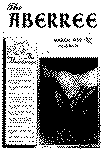Volume 5, Issue 10, page 8
waveringly into view. They glibly snapped
fingers at the "File Clerk", talked about
"The . Scanner", and never recognized the
jolt that flashed back thru memory channels when the scanner hit'the occluded
charge of grief and terror. Instead, they
suddenly got mad at Hubbard, or the auditor, or "couldn't waste any more of their
precious time at such utter damnfoolishness " as all this had suddenly turned out
to be.
Many of the men and women who persisted as auditors and even as officials in
the various Iiubbardian organizations fell
victim to the pitfall that always preceded the terror and grief which Gaps the
violent "secondary engrain", and these,
too, have caused unjust judgments against
Hubbard when neutral observers see them
dramatizing some illogical course of action that comes directly out of the "dodge"
they are stuck in. These, of course, are
essentially s t i 1 1 where they started
eight years ago -- or perhaps it would be
more accurate to say, are still where
they dodged to when the scanner hit that
charge of terror.
It is quite probable that even after
eight years of work, even the best of the
men in the field are still tagging along
five years behind Hubbard in understanding and application, despite having all
his data available, and as much hell, as
it is possible for one man to give to
another. And, by the law of diminishing
returns, it's highly unlikely that in
five more years anyone will be less than
three years behind.
'tHis leads one to the inevitable conclusion that success or failure of any
auditing project was entirely an individual thing -- let a pre-clear who was determined to break into the occlusions start
tossing some of that wild static around
and at the auditor with a similar, hidden
charge; or a person of low courage, and
the session would end right there with
failure of the auditor. Or, let an auditor
lead with inspired insight and get a low
courage level pre-clear up around an ally
loss, or the more important incident where
the ally became an ally -- no matter how
ridiculous the occasion really was -- and
off went the pre-clear on a wild tangent.
Whom did they blame? Hubbard, of course !
Naturally, the heaviest of all possible
techniques were always used as a standard
practice, regardless of where the preclear was on the Tone Scale, or how much
emphasis Hubbard always placed on very
cautious approaches, and running light
locks on what was called "straight wire".
Every screwball "forcing" technique
under the sun could seem to get widespread dissemination and universal use"misuse" would be a more fitting term.
The worst and most atrociously used of
these was popularly called "Effort ", and
there must have been as many variations
and misunderstandings of its meaning and
use as there were persons who practiced
it. Oddly enough, altho Hubbard discussed
it in lectures and assigned teams of auditors in Wichita to experiment with it,
it was never issued as a standard treatise, outlined in book form, or accepted
as a basic technique by Hubbard himself.
Yet, by word of mouth, because of wild
phenomena it developed out of the very
essences of insanity, it spread l i k e
wildfire from coast to coast and became
the juggernaut that clobbered what might
have otherwise been a steadily growing
Dianetic movement. It was tailormade to
attract the idiots and incompetents, and
for a long time it caught up the.entire
group of auditors who knew about it and
it spun them all. It led directly into a
hellish structure of fantasy popularly
called Facsimile One, and keyed in every
pain-drug-hypnotic incident in the engram
bank from the beginning of time.
Who did we blame? L.R.H. Did Hubbard
say to "run it"? Not by a damn sight. He
said, "Always use the lightest technique
possible. Never run anything that slaps a
loss on the pre-clear. Stay away from the
days on end of perpetual pain and unconsciousness". Run light stuff -- it's too
heavy half the time -- but no one listened.
Hubbard said, "Run the grief, it's the
glue that sticks engrams together .% He
did not say to have a Tire-clear sit
around in present time bawling and feeling sorry for himself; he said, "Get the
grief out of the original incident -- where
it is located in space and time on the
track." But, nobody did that. It took
persistence, patience, determination, and
the ability to keep working in spite of
what keyed in on the auditor -- so, off we
went with "Effort" in a thousand variations, each tailored to fit a particular
auditor's engram bank.
This brings up the question of what,
perhaps, should have been a more reliable, specific course of action. Away with
generalities and ambiguities! Fortunately
this can be covered in a letter that was
written several years ago by one Dianeticist to another, and the next chapter in
this series will consist entirely of this
letter, cut to size, which discussed the
importance of straight wire and the running of "light locks '%
(ED. NOTE


